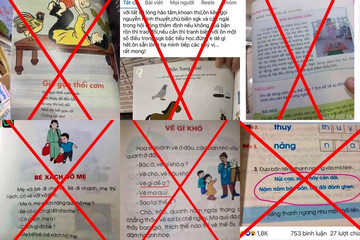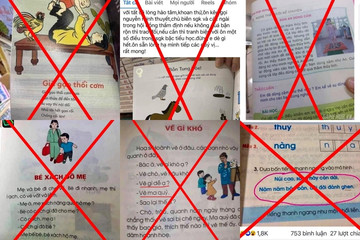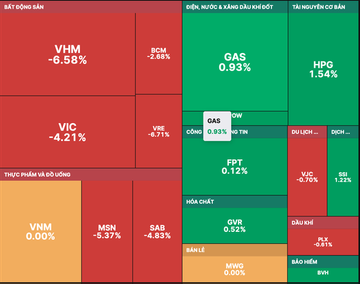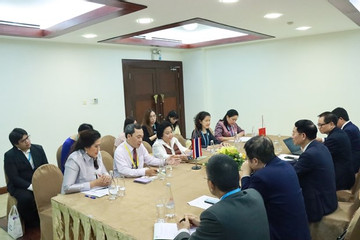- © Copyright of Vietnamnet Global.
- Tel: 024 3772 7988 Fax: (024) 37722734
- Email: [email protected]
fake news
Update news fake news
Traffic Police debunk fabricated story of high rewards for reporting violations
Hanoi Police have refuted claims circulating on social media that a young man earned 50 million VND in one day by reporting traffic violations, calling the information baseless and misleading.
Fake news drives off real news, harming businesses
Fake news and false rumors have become rampant on social networks, causing many businesses to lose trillions of dong in capitalization value.
Fanpage admin sanctioned for spreading misinformation about Hanoi flooding
After a fanpage post falsely claimed severe flooding in Hanoi, authorities moved to punish the admin responsible for approving the unverified content.
Public awareness serves as 'shield' against online fraud: MIC
Noting that people’s awareness is the most powerful weapon to fight online scams, the Authority of Information Security (AIS) said everyone needs to disseminate anti-scam knowledge to help protect the public.
Alert on Apple ID verification is misinformation: cybersecurity centre
Cybersecurity experts said that no attack linked to the ‘Apple ID verification’ has been reported and recommend users to fact-check before sharing information.
Efforts made to tighten management of information on social networks
The Authority of Broadcasting and Electronic Information reported that in 2023, it had repeatedly worked with foreign service providers like Meta (Facebook), Google, Apple and TikTok to prevent toxic information and fake news from spreading.
Social network users respond enthusiastically to anti-fake news campaign
Hundreds of entries and hundreds of millions of views on social platforms have been reported, which indicates support brought by the ‘Tin’ (News) campaign to the community.
Fake news appears again on social networks
Over the last week, fake news appeared on social networks, causing disorder among communities and affecting businesses.
SSC: Investors should beware of fake news when investing in stocks
The State Securities Commission (SSC) also recommends that investors should beware of fake news when investing in stocks.
Campaign seeks to prevent fake news, create healthier cyberculture
A communications campaign called "Chien dich Tin" was launched in Hanoi on October 11 to raise public awareness of fighting fake news, and improve cyberculture in Vietnam.
Thailand, Vietnam to collaborate in fight against fake news
Thailand will join hands with Vietnam to combat fake news, Thai Minister Attached to the Prime Minister's Office Puangpet Chunlaiad has said.
Cyberspace scams escalate post-pandemic
The police reported that the number of traditional crime cases have been on the decrease, but cyberspace crime has increased sharply, especially after the Covid-19 pandemic.
Vietnam’s advertising businesses needs a "Black List" to block toxic content
To avoid harmful advertising, companies should create a list of "toxic" content on the network (called a "blacklist").
Misinformation online influences, shapes public opinion
Many people spend hours a day surfing on Facebook, YouTube and TikTok at tea shops, cafes and other public areas, listening, reading and watching news and videos about important issues that have false information which misleads the public.
Disinformation online is appearing more frequently
Malicious information and toxic content have been appearing online at a higher frequency and in a more sophisticated manner.
Rape allegations on university's military training camp are fake news:University officials
Claims which surfaced on social media on Wednesday night about two female students being sexually assaulted on a military school campus are false, according to the military school and university officials.
Vietnam vows to eliminate false advertisements
With cooperation from the Ministry of Health (MOH), the Ministry of Information and Communications (MIC) has requested cross-border platforms to block exaggerated and untrue ads.
MIC issues handbook to prevent 'fake news'
The handbook released by the Ministry of Information and Communications (MIC) serves as an important tool to help the community of users to recognize false news, thereby joining forces to eliminate fake news and false news on cyberspace.
Fake news, rumors can severely destroy businesses
The popular use of social networks nowadays offers a great way for news to spread widely and quickly.
Ministry handles 'fake news', social-media sites resembling newspapers
The Ministry of Information and Communication (MIC) has joined agencies to handle violations on cyberspace, including fake news and social networks behaving as if they are newspapers or magazines.



















